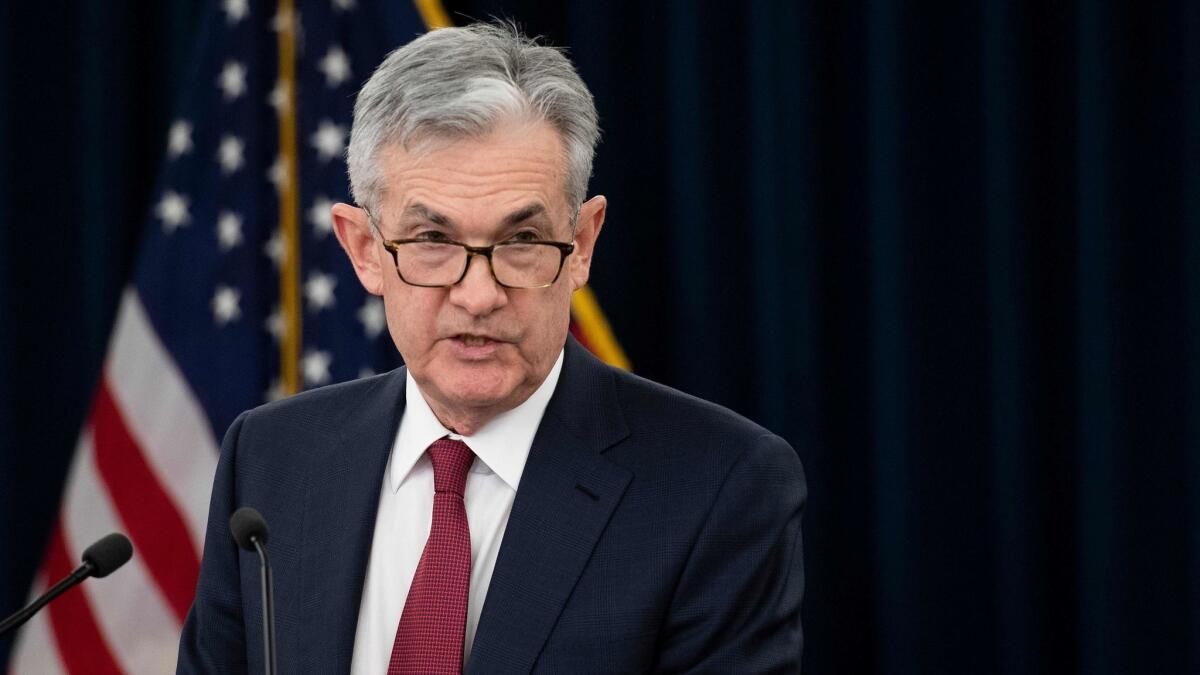Fed chief tells investors what they want to hear: The central bank will be ‘patient’ on more rate hikes

- Share via
Reporting from Washington — Despite the latest jobs report indicating the U.S. economy remains on solid footing, Federal Reserve Chairman Jerome H. Powell gave anxious financial markets some additional reassurance on Friday. Powell said the Fed would be “patient” to see how the economy develops before policymakers raised interest rates further.
News Friday that the economy added a robust 312,000 jobs last month was perhaps vindication for Powell and the Fed, which took heat from investors and President Trump for raising interest rates last month amid turmoil in financial markets. The central bank took the action on the basis of ongoing economic strength and its forecast for slower but still healthy growth this year.
At an economic conference Friday, Powell noted the “very strong” employment numbers for December and said the economy more broadly, including consumer spending, seems “to be on track to sustain good momentum into the new year.”
Then he gave investors what they wanted to hear: Even as he seemed to chide markets for getting “well ahead of the data” in reacting as if a downturn were imminent, Powell said that Fed policymakers were prepared to adjust monetary policy “quickly and flexibly” to keep the economy growing.
The Fed has raised its key interest rate in each of the last five quarters, in part to get ahead of potentially rising inflation as the labor market has tightened and the economy has been growing above potential. And policymakers have penciled in two more rate hikes for this year.
But Powell said Friday that the Fed is not on a preset course and that it is “listening and sensitive” to signals from financial markets. He added that ahead of 2016, the Fed had projected four rate hikes for that year but ended up raising rates just once at the end of that year.
Moreover, Powell said that subdued inflation — it has been running a bit below 2% — gives the Fed greater latitude on interest rates.
“With the muted inflation readings that we’ve seen coming in, we will be patient as we watch to see how the economy evolves,” Powell said at an annual meeting of the American Economic Assn. in Atlanta.
Powell spoke in response to questions directed to him and his two immediate predecessors, Janet L. Yellen and Ben S. Bernanke, now both with the Brookings Institution.
Yellen, who was Fed chair until early February of last year, agreed with Powell that “we have a pretty strong economy,” with consumers benefiting from good job and income growth, as well as housing market gains and lower oil prices.
“I don’t think expansions die of old age,” she said, referring to the current period of 9 1/2 years of continuing economic growth.
Bernanke said that there is an “excellent chance” of the economic expansion breaking the record this summer, although he also said he expected some slowing this year. The previous longest growth in the U.S. economy lasted 10 years, from 1991 to 2001.
Some analysts see a recession in 2020, but financial markets have been pricing in a possible downturn earlier, worried about the U.S. trade war with China, slowing global economic growth and political upheaval at home, with the partial government shutdown entering its third week on Saturday.
Corporate earnings also are a worry. Stock markets pulled back sharply on Thursday after Apple lowered its revenue forecast largely because of weaker sales in China. Other companies, including Delta Air Lines and FedEx, also have issued lower earnings guidance. But after the jobs report and remarks from Powell, stocks on Friday more than recouped the losses of the previous day.
Adding to the positive news for investors, China’s central bank on Friday moved to free up more money for banks to lend, its latest effort to support an economy that has been slowing because of softer consumer spending and concerns about the trade conflict.
In addition to raising interest rates, the Fed has been slowly shrinking the amount of bonds that it bought in past years through its quantitative easing program to lower long-term interest rates and stimulate growth. Investors have criticized that move as also hurting stocks, but Powell said Friday that he didn’t think the reduction in the Fed’s balance sheet had much to do with the market sell-off.
Even so, Powell said that “if we reach a different conclusion, we wouldn’t hesitate to make a change.”
Powell comes up on his first full year as Fed chair in early February. He has been under heavy pressure from Trump, who, breaking from past presidential protocol not to publicly criticize monetary policy actions by the independent Fed, has blasted the central bank for its recent rate hikes.
There has been speculation that Trump is considering firing Powell, although it isn’t clear the president has such authority. Trump appointed Powell to the post instead of renominating Yellen, who left after one four-year term as Fed leader.
Powell said that he had not received “direct communication” from the White House and that no meeting between Trump and him has been scheduled. Asked if he would resign if Trump asked him to do so, Powell responded curtly, “No.”
Twitter: @dleelatimes
More to Read
Inside the business of entertainment
The Wide Shot brings you news, analysis and insights on everything from streaming wars to production — and what it all means for the future.
You may occasionally receive promotional content from the Los Angeles Times.











